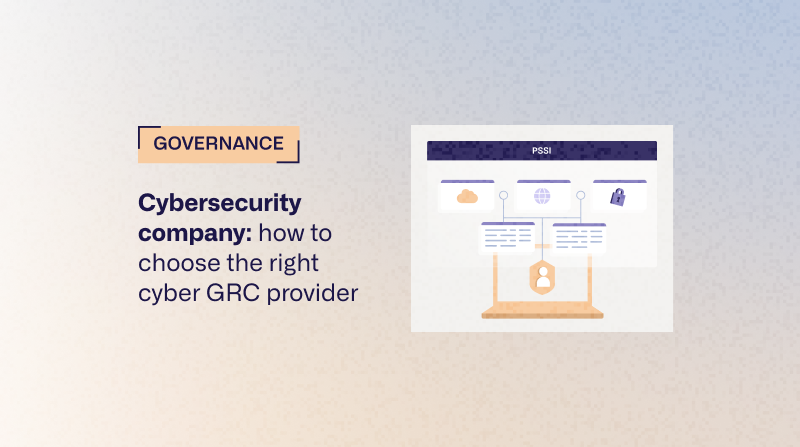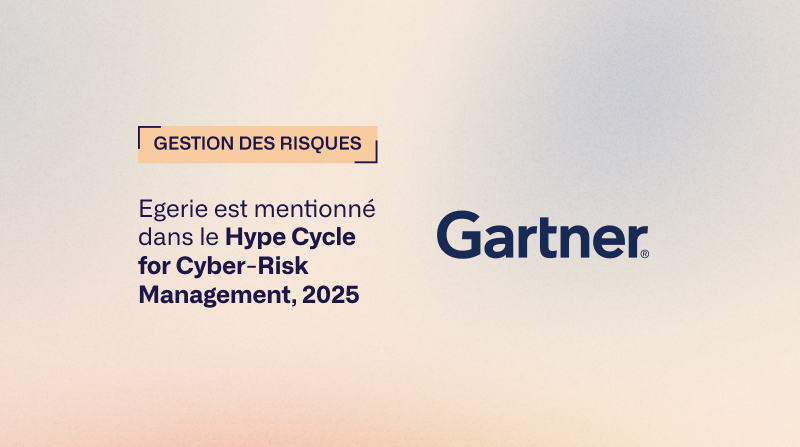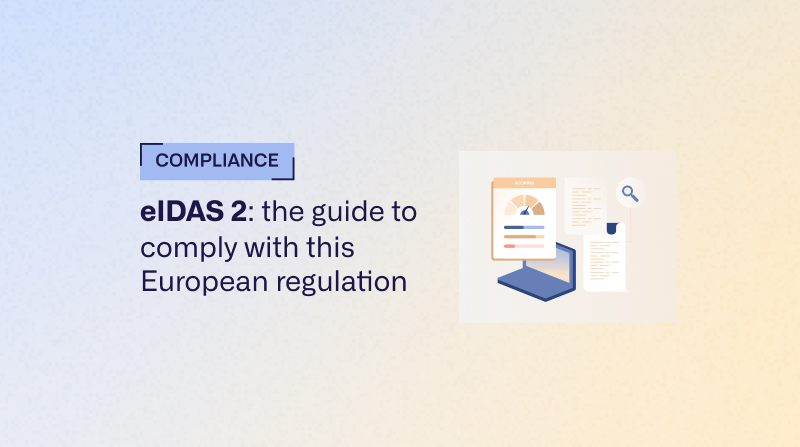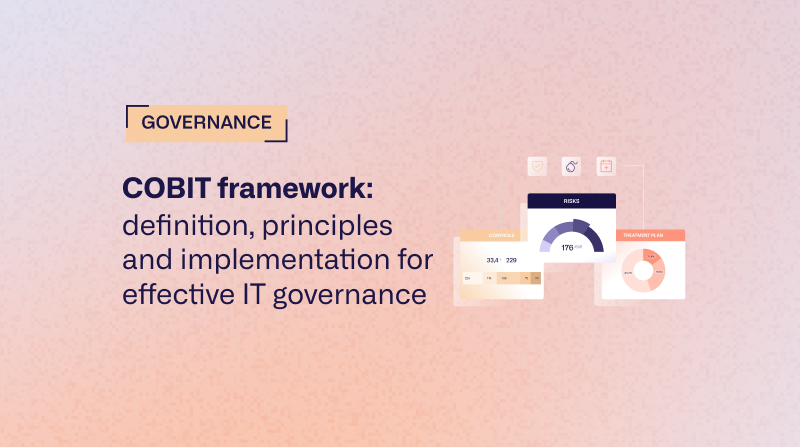Cybersecurity company: how to choose the right cyber GRC provider
Discover the essential criteria for selecting a cybersecurity company adapted to your governance and data protection challenges. Follow our expert advice to ensure your business is secure and compliant against cyber threats.
Choosing the right cybersecurity partner is a strategic decision that determines the protection of your data and the resilience of your business. Faced with the multiplication of threats, businesses must rely on experts who can secure their information systems while aligning technology with governance, risk, and compliance (GRC) goals.
In France, the market for cybersecurity companies is growing rapidly and exceeds several billion euros. These players include very different providers: consulting companies, software solution publishers or managed service providers (MSSP). All of them contribute to strengthening the digital resilience of organizations, from large companies to SMEs, which are particularly exposed to threats.
This choice should leave nothing to chance. Whether you are a CISO, Risk Manager or business leader, this guide gives you the keys to assess and choose the service provider that will protect your organization.
What is a cybersecurity company?
A cybersecurity company is a company that specializes in protecting information systems, networks, and data against cyberattacks and unauthorized access. Its role goes well beyond simply selling antivirus software or firewalls.
These companies offer a comprehensive range of services and solutions to identify vulnerabilities, prevent threats, detect intrusions, and respond to security incidents.
The field of action of these actors is vast. It includes security audit, penetration testing, governance consulting, risk management, compliance regulatory, the training Of teams and the continuous monitoring of infrastructures. In France, the demand for these skills is growing strongly.
In fact, according to the Ministry of the Interior, in 2024, 348,000 digital hits were recorded in France, with an increase of 74% observed over five years. This alarming figure illustrates the paramount importance that companies, from SMEs to large groups, attach to the protection of their assets Numerical.
An effective cybersecurity company is more than just responding to incidents. It acts as a true strategic partner to implement a proactive security posture. Its objective: to provide organizations with the visibility and control they need to manage their security based on the real risks that weigh on their business.
There are generally three main categories of cybersecurity companies:
- MSSPs (Managed Security Service Providers), which provide 24/7 monitoring, threat detection, and operational security management.
- Software solutions publishers, such as Egerie or Stormshield, which offer platforms to manage risks or protect infrastructures.
- Consulting firms and integrators, such as Wavestone or Accenture, which support organizations in their cybersecurity strategy and compliance.
These stakeholder profiles are complementary: a company can rely on a specialized publisher to manage its risks, while working with an MSSP for operational detection.
How do you choose the right cybersecurity company? 7 tips for your CRM
The choice of a service provider should not be limited to a comparison of products or prices. It's about finding an organization whose expertise and solutions are aligned with your corporate culture, business goals, and cybersecurity maturity.
Here are 7 tips to guide you in this crucial selection for the governance of your security.
1. Evaluate the expertise and skills of teams
The first criterion is human. Cybersecurity is a field where the skills of experts make all the difference. Find out about the experience of the teams that will support you. Do they have recognized certifications (CISSP, CISM, ISO 27001) DORA, etc.)? What is their experience in your sector of activity?
A good service provider has multidisciplinary teams capable of understanding technical issues (security of the cloud, networks, applications) and governance requirements.
For example, customers like GRDF trust Egerie for its expertise in cyber risk modeling, proof of our ability to manage complex and critical environments. Expertise does not come down to the number of years, but to the ability to innovate and adapt to new threats. A trusted partner also invests continuously in the training of its teams to remain at the forefront of technologies and attack methods.
2. Analyze the adequacy of the services offered to your needs
All businesses express different needs and expectations. An SME will be looking for a turnkey solution to manage its main risks, while a multinational group will have complex compliance and reporting requirements. The cybersecurity company you choose must offer flexible services and solutions that are able to adapt to your context.
List your priority needs:
- Governance, Risk and Compliance (GRC): Do you need a tool to drive your security strategy, manage risks, and prove compliance with standards like The DORA regulation Or the NIS 2 directive ?
- Audit and advice : do you want to make a compliance audit or benefit from strategic support?
- Data protection: Is the security of your personal and sensitive data your number one priority?
- Testing and detection: do you need regular penetration tests (pentests) to identify your vulnerabilities?
SMEs or large groups: different needs
- One SMES will rather look for a turnkey solution that is simple to deploy and covers major risks, such as ransomware or data leaks.
- One large group must ensure that its service provider is able to support it in complex compliance procedures (ISO 27001, NIS 2, DORA) and to provide appropriate reports to management committees.
Egerie focuses on cyber GRC, providing a platform that allows systems to be mapped, risks analyzed dynamically, and informed decisions to be made. This centralized approach is often more effective than multiplying ad hoc solutions.
3. Verify customer references and industry experience
Experience is a guarantee of trust. A service provider that has already worked with companies in your sector will better understand your business, regulatory and operational constraints. Ask for case studies and references from customers who are similar in size and have problems similar to yours.
For example, in the health sector, organizations like MGEN use our platform to transform all of their cyber risk management. In the industry, players like the CCI of Corsica rely on our solutions to protect their strategic infrastructures.
These different Customer cases prove the provider's ability to meet very high security and compliance requirements, in particular for management of risks associated with third parties.
4. Favoring a risk-oriented approach and “Privacy by Design”
A modern approach to cybersecurity is not about applying protective measures blindly. It must be guided by a risk analysis rigorous.
Your future service provider must be able to help you identify and quantify the risks that really weigh on your business. What are the most likely threats? What are your most critical assets? What would be the financial and operational impact of a cyberattack?
This approach is at the heart of Cyber Security GRC. It makes it possible to prioritize investments and to ensure that every euro spent safely is used where it is most useful.
In addition, a visionary partner will integrate the concept of Privacy by Design. This means that you consider privacy and data protection early in the design of systems and processes, not as a patch added after the fact.
A cyber GRC provider that masters this concept will help you build systems that are natively secure and compliant with the GDPR, strengthening the trust of your customers. The Egerie platform is designed around this philosophy. It makes it possible to model risks from the project phase and to ensure that security and compliance are integrated at each stage.
Want to find out how we can help you take this proactive approach? Ask for a demo our solution now.
5. Examine the technology and tools offered by your cybersecurity provider
The services of a cybersecurity company rely on technologies and tools. Evaluate the quality and maturity of cybersecurity software proposed. Is it proprietary technology or an integration of third party products? Is the solution easy for your teams to deploy and use? Does it offer clear dashboards for management and reporting?
A good Cyber GRC platform should provide you with a centralized and consolidated view of your security posture. It should integrate with your existing tools (vulnerability scanners, SIEM, etc.) to automate data collection and provide real-time analysis.
For example, our platform uses advanced modeling technology that allows us to simulate attack scenarios and test the effectiveness of your protection measures.
6. Evaluate the quality of support and training
One cyber attack can happen at any time. In the event of an incident, the responsiveness of your service provider is crucial. Learn about service level guarantees (SLAs), technical support schedules, and incident management processes? Is the support team based in France? Is it easily reachable even in the middle of the night if a massive cyberattack takes place?
In addition to responsive support, a good partner must also help you develop your skills. Does it offer training programs for your teams, whether technicians, Information Systems Security Manager (RSSI) or even end users?
Raising awareness and training employees are pillars of protection, as humans often remain the first weak link in the security chain. A service provider that invests in your autonomy is a long-term partner.
7. Ensure the compliance and sovereignty of solutions
In a world where data regulations are becoming more and more stringent, it is critical that your provider Of cybersecurity respects the standards in force.
Here are a few questions to ask yourself: does the proposed solution comply with the GDPR? Is the data hosted in France? Does the company have recognized certifications such asISO 27001 or a qualification by theANSSI ?
Digital sovereignty is a major issue, especially for public sector organizations or operators of vital importance (OIV). Choosing a European player, whose solutions are developed and hosted in France or Europe, guarantees that your sensitive data is not subject to extraterritorial laws such as the Cloud Act American.
European leader in Cyber GRC, Egerie guarantees sovereignty and compliance, a decisive advantage for organizations that want to maintain control of their strategic information. By applying these seven tips, you are putting every chance on your side to select a competent cybersecurity provider that can support you over the long term.
A GRC platform like Egerie centralizes this approach and helps organizations transform cybersecurity from a constraint into a real performance driver. Ask now for a personalized demo and find out how to strengthen the resilience of your business.
Why is it so important to choose the right provider?
A mistake in choosing your cybersecurity partner can have disastrous consequences.
In 2024, ANSSI recalled that 60% of SMEs that are victims of a cyberattack file for bankruptcy within six months. Beyond financial losses, non-compliance with regulations can result in severe penalties. This is why choosing a suitable cybersecurity company is not only a technical issue, but a strategic decision that involves the sustainability and competitiveness of your organization.
Beyond the direct financial losses associated with a ransom or business interruption, a successful cyberattack can lead to an irreversible loss of trust on the part of your customers. Not to mention the deterioration of your brand image and severe regulatory sanctions.
A good provider does much more than provide tools, it provides a strategic vision and helps you in particular to:
- Aligning security with business goals : by understanding your priorities, it helps you invest smartly to protect what really matters.
- Gain visibility : thanks to clear dashboards and reports, you easily understand your risk level and communicate it effectively with your management.
- Streamline costs : a risk-based approach makes it possible to avoid unnecessary expenses in inefficient solutions and to concentrate resources where the impact is greatest.
- Ensuring business continuity : by anticipating threats, you strengthen the resilience of your business and ensure its ability to function even in the event of a crisis.
The role of the Risk Manager is central here. By relying on the right solutions, it transforms cyber risk management from a regulatory constraint into a real performance driver for the company.
Cybersecurity company FAQ
What services does a cybersecurity company offer?
A cybersecurity company can cover a broad spectrum of missions: security audit, risk management, regulatory compliance, intrusion tests, incident detection and response, or even employee awareness. Depending on your needs, it can intervene early to define a strategy, or operationally to secure your infrastructures on a daily basis.
What is the difference between an MSSP and a GRC consulting firm?
An MSSP (Managed Security Service Provider) focuses mainly on operations: 24/7 surveillance, threat detection, firewall management, etc. Its role is to manage the security infrastructure on a daily basis.
A company specialized in Governance, Risk and Compliance (GRC) like Egerie is positioning itself at a more strategic level. It provides the tools and expertise to assist management and RSSI to drive safety, make risk-based decisions, and ensure regulatory compliance. The two are complementary : the GRC defines the strategy, the MSSP executes it.
How much does a cybersecurity provider cost?
Costs vary enormously depending on the size of your business, the complexity of your systems, and the scope of services you want. A simple audit mission can cost a few thousand euros, while a comprehensive CRM solution with support costs differently, representing a strategic investment.
It's important not to see cybersecurity as a cost, but as an investment to protect the value of your business. A risk-based approach, like the one offered by Egerie, makes it possible to optimize this investment by focusing on the most critical threats.
Does an SME really need a specialized service provider?
Absolutely. Cybercriminals are increasingly targeting SMEs (60% of cyberattacks in 2024), considering them easier prey, as they are often less well protected than large groups.
An SME generally does not have the skills or the internal resources to manage its security effectively. Using a specialized service provider like Égérie allows it to benefit from high-level expertise and efficient tools at a controlled cost. It is the most effective way for an SME to protect itself against threats that could endanger its survival.








